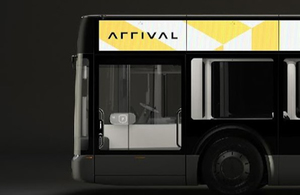Arrival: Innovate UK-backed firm achieves ‘unicorn’ status
UK electric vehicle maker Arrival has attained a valuation of €3 billion following backing from Innovate UK’s Industry Strategy Challenge Fund.

Arrival Bus
A UK maker of electric, autonomous-ready vehicles backed by Innovate UK has achieved ‘unicorn’ status (i.e. an evaluation of more than $1 billion).
Arrival’s valuation in early 2020 put the company’s value at €3 billion following an investment of €100 million from Hyundai Motor Group. The investment is part of a strategic partnership between Arrival and Hyundai whose aim is to help facilitate a global transition to electric vehicles.
The news of Arrival’s valuation was followed by an announcement that UPS had placed an order for 10,000 of Arrival’s electric delivery vehicles with the option of a further 10,000 over the coming years.
Arrival claims its vehicles represent an advance over previous iterations of commercial electric trucks and vans by costing the same as petrol and diesel equivalents and providing a better experience for all stakeholders. The move is part of UPS’s strategy to transform its fleet to zero emissions.
Nick Clay, head of homologation and regulatory affairs at Arrival, said, “Arrival’s vehicles represent a new category of electric transportation that surpasses traditional equivalents in their design and their cost.
“Arrival’s focus is on the experience for everyone who interacts with an Arrival product - that might be the driver, the passengers, a cleaner or fleet operator. In addition, we have worked so that our zero-emissions vehicles achieve price parity with fossil-fuel equivalents, with customers making even greater savings over the lifetime of the vehicle.”
To meet the anticipated demand from the transportation and logistics industry, Arrival will build microfactories located close to areas of demand and utilising local supply chains, the first of which will open near Bicester, Oxfordshire.
Nick said, “Our microfactories have been designed with a minimal footprint so they can be located closer to urban areas and produce products that are custom for the local market. This smaller footprint also means that they will cost less to build and be quicker to deploy so we can bring our products to market more rapidly.”
Arrival’s recent success comes off the back of government-funded research and development. The company took part in five research projects in 2018 and received total funding of £7.5 million, £5.6 million of which came from the Industry Strategy Challenge Fund for the Robopilot project. Arrival’s part in the project was to develop autonomous driving systems.
Since 2018 Arrival’s staff has grown from 525 to over 1,000 globally as it has focused efforts on developing the wider ecosystem around its zero-emission vehicles, including self-driving technology, charging and software, with the goal of creating an integrated transportation system for cities that is sustainable.
The company’s most recent product, the Arrival Bus, is described as a ‘best-in-class’, zero-emissions bus designed with the end user’s experience in mind, focusing on providing an attractive, hygienic and comfortable environment for urban travel.
Said Nick, “Through projects with Innovate UK, we have fostered relationships with industry leaders such as UPS, EDF and First Group, helping to build our reputation and expand our knowledge as we seek to make urban environments sustainable.”
Updates to this page
-
First published.